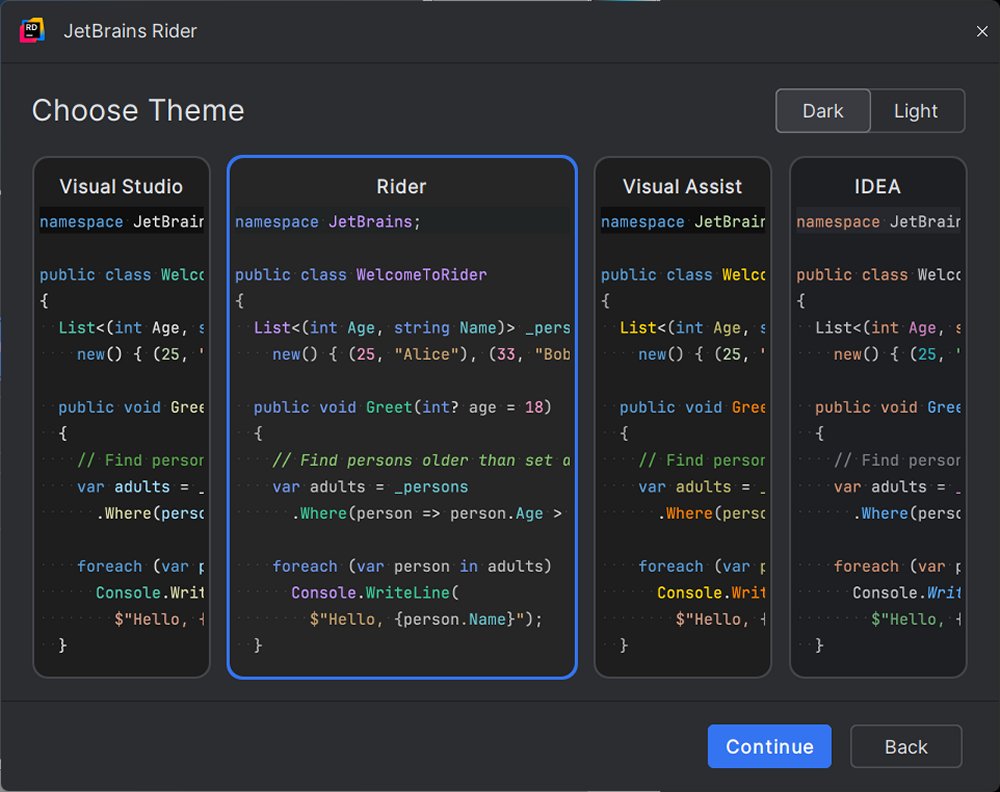JetBrains has released Rider 2025.1, a powerful cross-platform Integrated Development Environment (IDE) specifically designed for .NET developers. It offers a comprehensive suite of tools and features that cater to both modern and legacy development needs, providing an alternative for those who find Visual Studio's performance lacking.
Rider is built on a familiar platform for users of IntelliJ IDEA, PyCharm, or WebStorm, but is tailored to the .NET and C# ecosystems. It is particularly beneficial for freelancers and solo developers, featuring an integrated terminal, version control, and live code snippets that enhance productivity.
Key Features:
- Code Analysis and Refactoring: With over 2,200 inspections and 1,000 context actions, Rider helps developers identify and rectify issues in their code before compiling.
- Performance: Designed for speed, Rider outperforms Visual Studio, especially when integrated with ReSharper, making it suitable for large-scale projects.
- Debugger and Test Runner: The IDE supports a variety of testing frameworks, including NUnit, xUnit, and MSTest, as well as debugging for .NET and Mono applications.
- User Interface: Rider boasts a customizable UI with smart code suggestions and themes, including a robust dark mode.
Use Cases:
Rider caters to a diverse range of development environments, including:
- Game Development: Unity developers appreciate Rider’s seamless integration, coupled with efficient asset navigation.
- Web Development: Those working with ASP.NET and frameworks like React or Angular can manage both frontend and backend code from within the same IDE.
- Enterprise Development: Full support for microservices, containers, and SQL databases is available, enhancing workflow for enterprise-level applications.
Transitioning from Visual Studio:
Rider allows for a smooth switch from Visual Studio. It can directly open existing .sln and .csproj files, maintaining build configurations and recognizing most settings. Adjustments are minimal, with a specific Visual Studio keymap to facilitate the transition.
System Requirements and Licensing:
Rider operates on Windows, macOS, and Linux, supporting .NET Framework 4.6.1 or later, .NET Core, and Mono. It is free for non-commercial use, including educational and open-source projects. A commercial version is available with a 30-day trial, starting at $149 per month.
Pros and Cons:
Pros:
- High performance, even with large solutions
- Integrated ReSharper functionality
- Comprehensive support for various frameworks and tools
- Cross-platform consistency
Cons:
- Initial indexing may take time for large projects
- Some adjustment needed for former Visual Studio users
Overall Verdict:
JetBrains Rider is an ideal choice for developers seeking enhanced speed, control, and minimal bloat. It is particularly suited for those working on extensive .NET solutions or game development while providing a modern, customizable experience that allows developers to focus on software creation without unnecessary distractions.
Future Extensions:
As development needs evolve, future releases of Rider could further enhance collaboration tools, integrate advanced AI-driven coding assistance, and streamline cloud-based development workflows. The incorporation of more robust support for emerging technologies in the .NET ecosystem will also be crucial for maintaining its competitive edge
Rider is built on a familiar platform for users of IntelliJ IDEA, PyCharm, or WebStorm, but is tailored to the .NET and C# ecosystems. It is particularly beneficial for freelancers and solo developers, featuring an integrated terminal, version control, and live code snippets that enhance productivity.
Key Features:
- Code Analysis and Refactoring: With over 2,200 inspections and 1,000 context actions, Rider helps developers identify and rectify issues in their code before compiling.
- Performance: Designed for speed, Rider outperforms Visual Studio, especially when integrated with ReSharper, making it suitable for large-scale projects.
- Debugger and Test Runner: The IDE supports a variety of testing frameworks, including NUnit, xUnit, and MSTest, as well as debugging for .NET and Mono applications.
- User Interface: Rider boasts a customizable UI with smart code suggestions and themes, including a robust dark mode.
Use Cases:
Rider caters to a diverse range of development environments, including:
- Game Development: Unity developers appreciate Rider’s seamless integration, coupled with efficient asset navigation.
- Web Development: Those working with ASP.NET and frameworks like React or Angular can manage both frontend and backend code from within the same IDE.
- Enterprise Development: Full support for microservices, containers, and SQL databases is available, enhancing workflow for enterprise-level applications.
Transitioning from Visual Studio:
Rider allows for a smooth switch from Visual Studio. It can directly open existing .sln and .csproj files, maintaining build configurations and recognizing most settings. Adjustments are minimal, with a specific Visual Studio keymap to facilitate the transition.
System Requirements and Licensing:
Rider operates on Windows, macOS, and Linux, supporting .NET Framework 4.6.1 or later, .NET Core, and Mono. It is free for non-commercial use, including educational and open-source projects. A commercial version is available with a 30-day trial, starting at $149 per month.
Pros and Cons:
Pros:
- High performance, even with large solutions
- Integrated ReSharper functionality
- Comprehensive support for various frameworks and tools
- Cross-platform consistency
Cons:
- Initial indexing may take time for large projects
- Some adjustment needed for former Visual Studio users
Overall Verdict:
JetBrains Rider is an ideal choice for developers seeking enhanced speed, control, and minimal bloat. It is particularly suited for those working on extensive .NET solutions or game development while providing a modern, customizable experience that allows developers to focus on software creation without unnecessary distractions.
Future Extensions:
As development needs evolve, future releases of Rider could further enhance collaboration tools, integrate advanced AI-driven coding assistance, and streamline cloud-based development workflows. The incorporation of more robust support for emerging technologies in the .NET ecosystem will also be crucial for maintaining its competitive edge
Rider 2025.1 released
JetBrains Rider is a cross-platform .NET IDE built for serious developers who want deep code insight, fast performance, and smooth integration tailored for .NET and C#.


